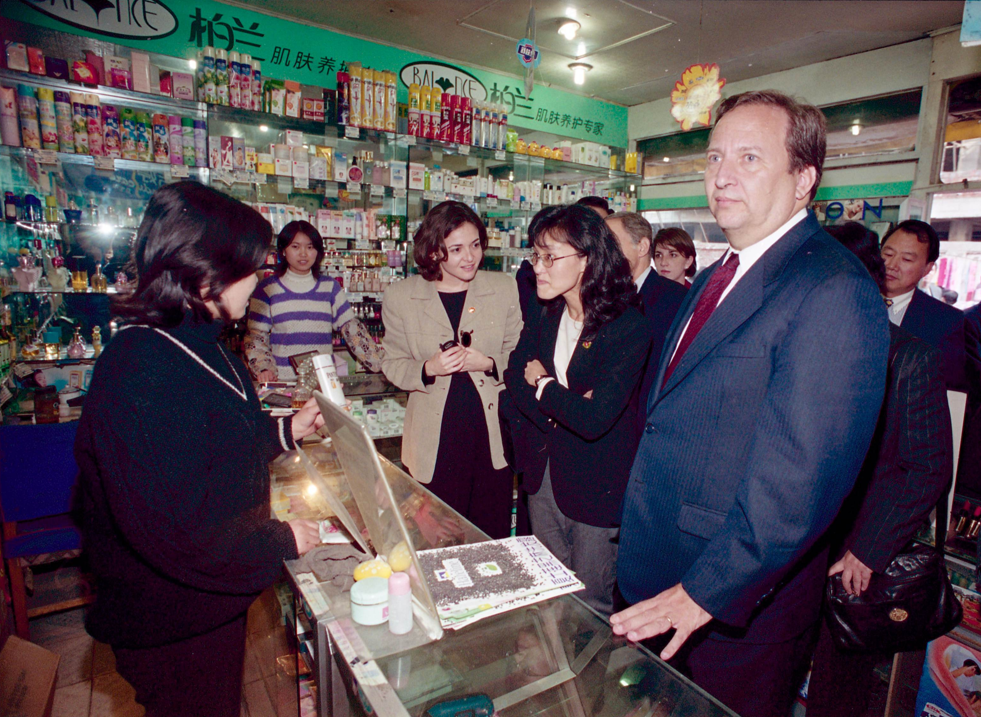Lawrence H. Summers, a prominent economist, has made unique contribution to public life, serving as chief economist of the World Bank, U.S. treasury secretary in the Clinton administration, president of Harvard University, and director of the National Economic Council under President Barack Obama.
James Chau of China-US Focus sat down with Summers to explore the relationship between China and the United States, which is at a critical crossroads. Summers presents an optimistic view as he looks to the future, recalling a key moment during the Cold War that suggests the two countries should be able to find common ground.

"Reagan asked Gorbachev: If Martians attacked the United States, would you come to our defense? And Gorbachev said yes, and then asked Reagan: If Martians attacked the USSR, would you come to our defense? And President Reagan said yes."
—— Lawrence H. Summers
James Chau:
Professor Lawrence Summers, thanks very much for your time. You know, when we look at your life’s work — your incredible, extraordinary life — you’ve helped shape U.S. economic policy at pivotal moments. As such, you’ve observed shifts in the U.S.-China relationship for a number of decades now. What lessons from past economic cooperation and competition do you believe are most relevant for us in navigating the complex dynamics of the bilateral relationship today?
Lawrence H. Summers:
I think the key lesson is that the relationship between the U.S. and China is ultimately a positive sum. It is possible to imagine a world in which the United States flourishes, China flourishes and the world flourishes. It’s also possible to imagine a world in which things work out very badly for the United States, for China and for the global economy. It’s much harder to imagine a world in which China is succeeding and the U.S. is failing, or a world in which the U.S. is succeeding and China is completely failing. And so, for better or for worse, our destinies are tied together.
When thinking about the United States and China, I like to use the image of two people who are very different, who do not have a close natural affinity but who find themselves in a two-oar lifeboat in a turbulent sea a long way from the shore. And their task is to get to the shore, and it doesn’t really matter whether they have affection for each other. It doesn’t really matter if they have different values or different views. Their prospects for survival and success depend upon their capacity to achieve cooperation — enough to get that rowboat to shore. That, I think, is the right way to think about the United States and China. It is not about who is right and who is wrong, who is worthy and who is unworthy, who is at fault and who is not at fault. It is about finding a modus vivendi in mutual interest.
James Chau:
Decoupling and de-risking have become much used terms when we talk about the economic relationship. But less spoken of is what we think could be the greatest potential for reestablishing economic cooperation. What do you think that is, particularly in light of current tensions around trade, technology and financial stability?
Lawrence H. Summers:
It is probably appropriate that there be greater elements of resilience in both societies than exist today. And so the notion of some greater resilience in the United States — from having access to more diversified supplies, or some greater resilience in China from having access to more diversified supplies — I think is a quite healthy notion. The idea of reducing single points of dependency is always a good one. I think there are large common enemies, large common adversaries, that we all need to think about. Climate change is potentially existential for Planet Earth. There’s also the risk of terror and global insecurity, particularly when associated with nuclear proliferation. And I think the very nature of human existence and human interaction is potentially going to be changed with the advent and rapid development of artificial intelligence. So I think these common challenges can be animated by cooperation between the United States and China.
I am very much influenced by the story of President Reagan and Premier Gorbachev in Reykjavik, where President Reagan turned to Premier Gorbachev at one point and said, if Martians attacked the United States, would you come to our defense? And Premier Gorbachev was surprised and thought about it for a moment, laughed and said yes, and then asked: If Martians attacked the USSR, would you, President Reagan, come to our defense? And President Reagan, too, said yes, and a greater sense of mutual trust was established. Martians aren’t going to attack the United States or China. But we do share common threats, such as nuclear proliferation, as well as opportunities and risks associated with artificial intelligence, the challenge of climate change, the risk of pandemic — and that can be a basis for cooperation in our mutual interest and in the greater global interest.
James Chau:
Maybe not Martians, as you said, but we have plenty of existential threats that you unpacked just now. Those threats are already here on our doorstep. The pandemic is just one of those examples, and they not only didn’t help each other but in fact widened the distance between them. It seemed to grow ever larger. Does that mean that we are in a more distrustful relationship than even the leaders of the USSR and the United States had during the Cold War?
Lawrence H. Summers:
I’m not sure that the level of distrust and the level of risk are yet at the level that they were during the Cold War. I think there’s a far greater degree of interdependence between the United States and China. Many more Americans live in China. Many more Chinese people live in America. Many more Chinese people have studied in American universities. Many more American businesses are operating in China. I think all of that connection at the person-to-person level offers a foundation for more trust and less hostility than existed during the Cold War between the United States and the Soviet Union. But I think one does have to be concerned, from an American perspective, by the very substantial militarization in China, which does raise real questions and point toward the possibility of a return to a more Cold War-like dynamic.
James Chau:
You mentioned artificial intelligence. Among your many roles, one is a seat on the board of OpenAI. In light of intensifying U.S.-China competition, what do you believe are the stakes of advanced AI without substantive and meaningful collaboration between two AI leaders?
Lawrence H. Summers:
I think there are risks that these systems will be used to allow the dissemination of knowledge that can be very dangerous — for example, the creation of very dangerous and lethal weapons, the risk of fakes that serve as major provocations or support intrusions in other societies and risks that these systems will not be fully controlled by human beings.

Treasury Secretary Larry Summers visits China on October 24, 1999. He is the first Cabinet-level U.S. official to visit China after NATO warplanes bombed the Chinese Embassy in Yugoslavia. During his visit, Larry Summers and China’s Prime Minister Zhu Rongji discussed economic issues and China’s campaign to enter the World Trade Organization.
James Chau:
You also have three children of your own who will themselves be navigating a world very different from the one you knew at their age. You’ve spoken about the antisemitism that is sweeping the world. Is that one of the factors alongside pandemics and a declining climate condition, that concerns you, or that is among the top global challenges for you and your family?
Lawrence H. Summers:
Yes, but I see my children as living in a world community, as well as certain dangers. I think we’re going to see the advent of extremely inexpensive renewable energy during my children’s lifetime. I think we’re going to see staggering progress in the life sciences that is going to drive incredible efforts to conquer diseases that have been scourges of mankind for centuries. And I think the application of artificial intelligence offers an unprecedented opportunity to relieve humans of tasks that are repetitive, tedious and unfulfilling and to have an opportunity to put their energy into connecting with other people, to put their energy into creative pursuits. I am someone who’s very much a believer in the idea of progress.
James Chau:
Last, Professor Summers, of course I’m speaking to you ahead of one the most anticipated U.S. elections globally, with the prevailing view that U.S.-China ties will remain competitive regardless of the outcome of this vote. What strategies do you think China can adopt in managing its relationship with Washington, with whichever president over the next four years?
Lawrence H. Summers:
I think China needs to think about how to provide reassurance that it is prepared to peacefully coexist with the United States, which means paying close attention to military measures that could reasonably be interpreted as aggressive. That means being careful with respect to actions it takes that can be seen as interference with our society, whether those are cyberattacks or other kinds of measures. I think it also goes to the relationship between Chinese companies and the Chinese government and the concern that what are presented as private Chinese companies are in fact government-controlled entities. And so I think if China is able to provide that kind of assurance and compete on a fair basis, then relations between our nations will turn around.